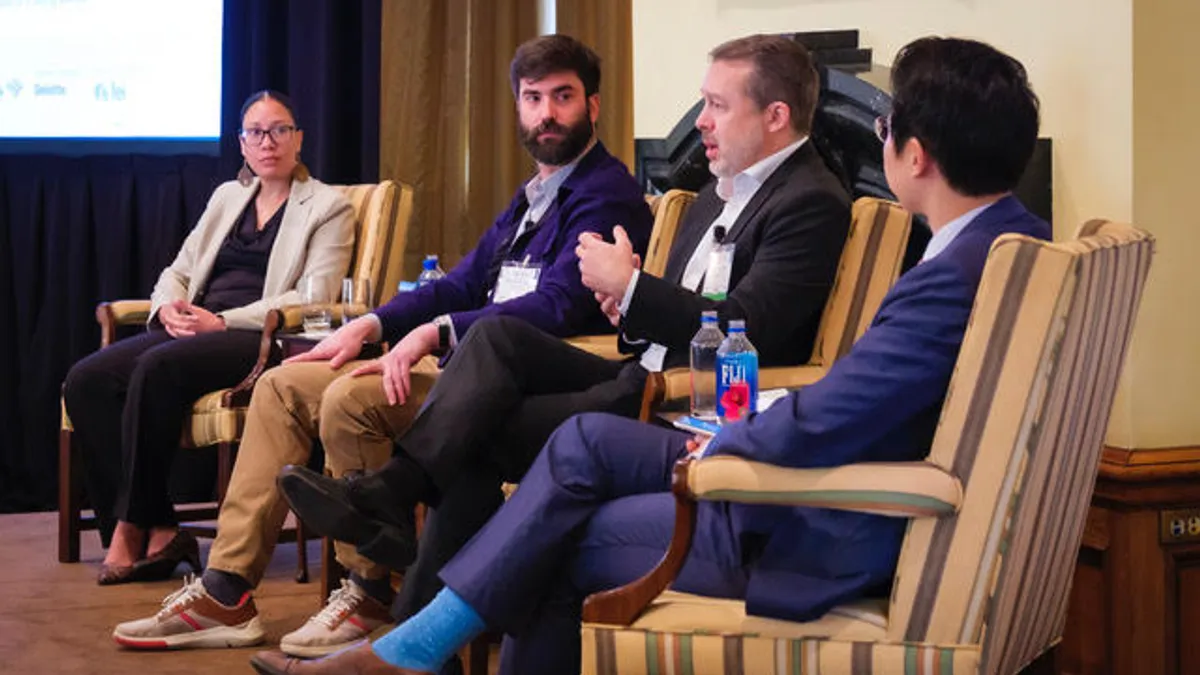The nuanced picture that three CFOs painted Tuesday of the inherent business opportunities and challenges posed by environmental, social and governance initiatives starkly contrasted with the backlash that has roiled the public ESG debate recently.
So, just why is ESG so controversial? That was one of the questions asked by Aaron Yoon, a professor at Northwestern University’s Kellogg School of Management, of the three finance chief panelists during a wide-ranging discussion on the topic at a Crain’s Chicago Business CFO event this week.
“It’s controversial because it’s hard…it’s difficult to define and difficult to measure,” said Geoff Trukenbrod, CFO of LanzaTech and a panelist, adding that he would debate anyone who still questioned whether it was good for business. “I think that debate is over, at least in my mind.”
The panel included Trukenbrod, whose Skokie, Ill.-based firm provides carbon recycling technologies being used to turn emissions from steel mills into polyester; Angela Dowell, CFO of the not-for-profit Chicago Community Loan Fund which provides financing to community development projects; and Matthew Strongin, CFO and co-founder of Chicago-based Nature’s Fynd, a food company that makes meat and dairy alternatives using fungi proteins.
The topic is an increasingly heated one, with the Securities and Exchange Commission expected to release a final rule before May mandating that companies describe on Form 10-K their strategy toward climate risk. Indeed this week SEC Chair Gary Gensler came under fire from Republican lawmakers who said the SEC was exceeding its authority and would impose a disclosure burden that would be especially onerous for small businesses and farmers, CFO Dive previously reported.
Though the business models of the finance chiefs on the Crain’s panel largely dovetail with many ESG initiatives or those of their clients, they acknowledged some of the difficulties that they face from backlash on both sides as well as the consequences of the disclosures that they provide in their financial reports.
For example, Dowell said she’s mindful that once she puts social goals or KPIs in her reports she’ll be held accountable to meet them. At the same time, she can win over investors who are incentivized to back ESG goals, such as creating jobs that build stronger communities, she said.
If an investor wants to invest $5 million for five years, she said it’s hard to compete against the returns they could get elsewhere. “But what they’re also getting is a social return from us, so we have to be able to define those social impacts.”
Strongin said his firm is motivated to engage in ESG with a greater emphasis on environmental factors, which he said helps the firm market itself to consumers.
He suggested the environmental impact of the food industry rivals that of electric vehicle cars that get so much attention. While 3 million cars are sold annually in the U.S., he said there are 465 billion eating occasions. He sees ESG as both a profit imperative and a moral imperative which businesses can leverage to help shape the public’s outlook on the issues and inform consumer decisions.
“What businesses and non-profits like ours can do is create this flywheel effect where it’s not just us in our businesses that are making that sale or engaging with the client but we are also making it part of the public discourse and public dialogue affecting how people choose to engage with service providers and goods,” he said.












